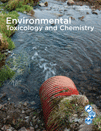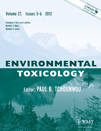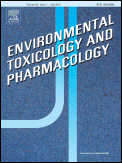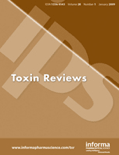
ENVIRONMENTAL TOXICOLOGY AND CHEMISTRY
Scope & Guideline
Navigating the intersection of health, toxins, and the environment.
Introduction
Aims and Scopes
- Ecotoxicology of Emerging Contaminants:
The journal emphasizes research on emerging contaminants such as per- and polyfluoroalkyl substances (PFAS), pharmaceuticals, and microplastics, exploring their ecological impacts and mechanisms of toxicity across diverse species. - Chemical Risk Assessment:
A significant focus is placed on developing methodologies for assessing the risks posed by toxicants to aquatic and terrestrial organisms, including the use of modeling approaches to predict exposure and effects. - Biodiversity and Ecosystem Health:
Research articles often address the relationship between chemical exposure and biodiversity, examining how contaminants affect population dynamics, community structure, and ecosystem services. - Biomarkers and Mechanistic Studies:
The journal publishes studies that utilize biomarkers and mechanistic insights to elucidate the effects of pollutants at molecular, cellular, and organismal levels, contributing to a better understanding of toxicity pathways. - Transdisciplinary Approaches:
Research often integrates various scientific disciplines, including toxicology, ecology, and environmental chemistry, to address complex environmental issues and promote sustainable practices.
Trending and Emerging
- Microplastic Pollution:
There is a growing volume of research dedicated to understanding the sources, fate, and ecological impacts of microplastics in various environments, highlighting their pervasive nature as an environmental contaminant. - Pharmaceutical Contaminants:
The investigation into the occurrence and effects of pharmaceuticals in aquatic systems is gaining traction, particularly concerning their ecological impacts and potential risks to wildlife and human health. - Omics and Systems Biology Approaches:
Emerging studies increasingly employ omics technologies (e.g., transcriptomics, metabolomics) to assess the biological effects of contaminants, providing deeper insights into the mechanisms of toxicity and organism responses. - Climate Change Interactions:
Research examining the interactions between chemical stressors and climate change is becoming more prevalent, addressing how changing environmental conditions may alter the toxicity of pollutants. - Cross-Species Extrapolation:
There is an increasing emphasis on methodologies for cross-species extrapolation to improve risk assessment frameworks, ensuring that findings from model organisms can be reliably applied to other species.
Declining or Waning
- Traditional Toxicology Methods:
There is a noticeable decline in studies solely relying on traditional toxicity testing methods without integrating modern approaches such as omics technologies or modeling frameworks. This reflects a broader trend towards more holistic and interdisciplinary research. - Focus on Single Contaminants:
While previous years saw substantial attention on the toxicity of individual contaminants, recent publications show a growing preference for studying complex mixtures and their cumulative effects, leading to less emphasis on single-contaminant studies. - Historical Contaminant Studies:
Research examining the historical impacts of legacy contaminants, such as DDT or PCBs, is becoming less frequent, as contemporary concerns regarding emerging contaminants take precedence in research agendas. - Agricultural Contaminants:
The focus on traditional agricultural pollutants, such as specific pesticides and fertilizers, appears to be waning, possibly due to the increasing emphasis on integrated pest management and sustainable agricultural practices.
Similar Journals

Reviews of Environmental Contamination and Toxicology
Pioneering insights into environmental challenges and solutions.Reviews of Environmental Contamination and Toxicology is a leading journal published by SPRINGER, dedicated to advancing the understanding of environmental science, toxicology, and public health. Since its inception in 1987, this esteemed journal has established itself as an invaluable resource for researchers and practitioners alike, showcasing a wealth of peer-reviewed articles that delve into the complexities of environmental contaminants and their effects on human health and ecosystems. With an impressive impact factor and consistently ranking in the Q1 category across multiple fields including Health, Toxicology and Mutagenesis, as well as Public Health, this journal commands attention, boasting Scopus rankings that place it among the top-tier publications globally. Researchers will find that the journal provides not only in-depth reviews but also practical implications for policy and practice regarding environmental issues. Located in the heart of New York, Reviews of Environmental Contamination and Toxicology is poised to remain at the forefront of this critical field through 2024 and beyond, making it an essential addition to the library of any environmental health scholar or practitioner.

Journal of Hazardous Materials Letters
Exploring the intersection of toxicity and environmental stewardship.Journal of Hazardous Materials Letters, published by ELSEVIER, is a premier open access journal that has rapidly gained prominence in the fields of Environmental Chemistry, Environmental Engineering, Health, Toxicology and Mutagenesis, Pollution, and Waste Management and Disposal since its inception in 2020. With an impressive categorization in the top quartile (Q1) across all its relevant disciplines in 2023, this journal ranks favorably within the Scopus database, positioning itself in the upper echelons of Environmental Science—ranked 23rd in Environmental Engineering and 19th in Health, Toxicology and Mutagenesis among its peers. It serves as a vital platform for the dissemination of high-quality research focused on addressing hazardous materials and their impacts on health and the environment. The journal's commitment to open access facilitates immediate and broad dissemination of research findings, ensuring that essential knowledge reaches a global audience of researchers, professionals, and students eager to advance the field. With its ongoing convergence into 2024, the Journal of Hazardous Materials Letters continues to drive innovation and influence practice in managing hazardous materials for a sustainable future.

ENVIRONMENTAL TOXICOLOGY
Decoding the Complexities of Environmental ToxinsENVIRONMENTAL TOXICOLOGY, published by Wiley, is a premier academic journal dedicated to the multifaceted study of toxic substances in the environment and their effects on human health and ecosystems. With the ISSN 1520-4081 and E-ISSN 1522-7278, this journal holds a prestigious position in the field, being ranked in the Q1 category across various relevant disciplines, including Health, Toxicology and Mutagenesis, and Management, Monitoring, Policy and Law. The journal regularly publishes high-quality research articles, reviews, and policy discussions aimed at understanding the implications of environmental toxins from 1980 to the present, contributing to the body of knowledge critical for the safety and sustainability of our environment. Researchers and professionals will find a treasure trove of information that not only highlights current trends and methodologies but also sets the stage for future advancements in toxicology. As a key resource, it provides valuable insights necessary for policy-making, environmental management, and public health, reinforcing its significance in the ever-evolving fields of toxicology and environmental science.

Toxics is a leading international journal published by MDPI that has been dedicated to advancing the knowledge in the fields of toxicology, environmental health, and chemical safety since its inception in 2013. With an impressive Open Access model, it ensures that all research findings are readily available to a global audience, fostering collaboration and innovation across academia and industry. The journal is esteemed for its rigorous peer-review process and holds notable rankings, including Q1 status in Chemical Health and Safety and Q2 in both Health, Toxicology and Mutagenesis and Toxicology, reflecting its impact on critical research areas. Based in Basel, Switzerland, Toxics provides a platform for researchers, professionals, and students to disseminate significant findings on the implications of toxic substances in health and the environment, aiming to improve public health outcomes and inform regulatory decisions. With its ongoing commitment to high-quality research and relevant access options, Toxics continues to be an essential resource in the domain of toxicology and environmental sciences.

Current Research in Toxicology
Unveiling the Complexities of Toxicological ImpactCurrent Research in Toxicology is a pioneering journal published by ELSEVIER that serves as a vital platform for disseminating cutting-edge research in the field of toxicology, spanning from biological impacts to pharmacological applications. With an ISSN of 2666-027X and an impressive Q2 ranking in key categories such as Applied Microbiology and Biotechnology, Health, Toxicology and Mutagenesis, and Toxicology, this journal underscores its commitment to high-quality research and significant contributions to the scientific community. Based in the Netherlands, Current Research in Toxicology aims to bridge the gap between academia and industry by providing rigorously peer-reviewed articles that cover a wide array of topics including novel methodologies, regulatory challenges, and emerging trends within the domain. The journal is accessible through various platforms, making it essential for researchers, professionals, and students eager to stay updated on the latest findings and advancements in toxicology. With a comprehensive focus on integrating theory with practical application, this journal is poised to influence future studies and policies in health and environmental science.

Environmental Toxicology and Pharmacology
Bridging the gap between toxicology and pharmacology.Environmental Toxicology and Pharmacology, published by Elsevier, is a leading journal dedicated to advancing our understanding of the effects of environmental pollutants on biological systems. With an ISSN of 1382-6689 and an E-ISSN of 1872-7077, this journal covers a wide range of studies related to toxicology, pharmacology, and environmental health. The journal is classified as Q2 in key categories such as Health, Toxicology and Mutagenesis and Medicine (miscellaneous), and sits impressively in Q1 for Toxicology, reflecting its strong impact in the field. As of 2023, it ranks #30 out of 133 in Toxicology and #40 out of 148 in Health, indicating its high relevance and contribution to research. While the journal is not currently open access, it remains a pivotal resource for researchers, professionals, and students seeking to explore the intricacies of environmental health effects. Its commitment to publishing high-quality peer-reviewed research positions it as a crucial platform for scientific dialogue and discovery.

Toxin Reviews
Empowering Science Through Open Access ResearchToxin Reviews is a premier academic journal focused on the critical field of Toxicology, published by Taylor & Francis Inc. Established with an aim to foster research and disseminate knowledge, this journal has been pivotal since its inception in 1982 and continues to be a leading platform for both emerging and established researchers. With an impressive impact factor and ranked in the 75th percentile among its peers in the Scopus categories, it serves as an essential resource for scientists, practitioners, and students interested in understanding the complexities of toxins and their effects on health. The journal provides an Open Access platform, enhancing visibility and accessibility of research findings to a broader audience. Covering a wide scope, Toxin Reviews plays a vital role in bridging gaps between toxicological research and practical applications, ensuring that rigorous scientific inquiry translates into real-world solutions.

Toxicology Research
Unveiling the complexities of toxic substances.Toxicology Research is a distinguished journal dedicated to advancing the field of toxicology through the dissemination of high-quality research. Published by Oxford University Press, this UK-based journal focuses on critical aspects of toxicology and mutagenesis, highlighting both environmental and pharmacological implications. With an ISSN of 2045-452X and an E-ISSN of 2045-4538, it serves as a valuable resource for researchers, professionals, and students alike. Currently categorized in the Q3 quartile for Health, Toxicology and Mutagenesis, as well as Toxicology in 2023, Toxicology Research maintains a visible presence in Scopus rankings, positioning itself within the targeted professional community. Although the journal operates without open access options, its importance in contributing to scientific discussions and policy formation is undeniable. Covering content from 2012 to 2024, it continues to provide insights into contemporary toxicological challenges, thereby fostering interdisciplinary collaborations and informing best practices in health and safety.

Journal of Environmental Science and Health Part C-Toxicology and Carcinogenesis
Illuminating the Path from Toxicology to Public HealthThe Journal of Environmental Science and Health Part C-Toxicology and Carcinogenesis is a vital publication in the fields of environmental science, toxicology, and cancer research, published by Taylor & Francis Inc. With an ISSN of 2689-6583 and E-ISSN 2689-6591, this journal provides a platform for peer-reviewed research that explores the intersection of environmental factors and health outcomes, particularly focusing on toxicological and carcinogenic impacts. Though it does not currently offer Open Access, it remains a significant contributor to academia with its current ranking in the Q4 category for Cancer Research and Q3 in Health, Toxicology and Mutagenesis. The journal has converged from 2020 to 2024 and aims to disseminate pioneering studies that inform public health policies and foster a deeper understanding of environmental toxins. Aspiring researchers, professionals, and students will find this journal to be an essential resource for the latest findings and discussions within these critical fields.

TOXICOLOGY
Exploring the complexities of toxic substances and their effects.TOXICOLOGY, published by Elsevier Ireland Ltd, is a prestigious peer-reviewed journal specializing in the field of toxicology. With an ISSN of 0300-483X and an E-ISSN of 1879-3185, this journal provides a vital platform for researchers, professionals, and students to disseminate and access groundbreaking studies from 1973 to present, with a convergence set until 2024. Recognized for its high impact, it holds a Q1 ranking in Toxicology category and ranks #18 out of 133 in Scopus's sector of Pharmacology, Toxicology, and Pharmaceutics, placing it in the 86th percentile. While the journal is not open access, it nonetheless offers a rich collection of research articles that enhance the understanding of toxicological science and its applications. The journal's objectives encompass advancing knowledge in the toxicological evaluation of substances, promoting safety in public health, and fostering dialogue among scholars. As a key resource in the field, TOXICOLOGY plays a crucial role in advancing research and informing practices related to toxicological risks and safety assessments.